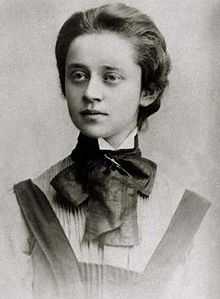Sophia Parnok
| Sophia Yakovlevna Parnok | |
|---|---|
 | |
| Born |
11 August 1885 Taganrog, Russian Empire |
| Died |
26 August 1933 (aged 48) Moscow, Soviet Union |
| Occupation | poet |
| Nationality | Russian Jewish |
| Period | 20th Century |
Sophia Yakovlevna Parnok (11 August 1885 – 26 August 1933) (first name is sometimes spelled Sofia or Sofya) (Russian: Софи́я Я́ковлевна Парно́к), was a Russian poet and translator, sister of poet Valentin Parnakh, and children's author Yelizaveta Tarakhovskaya. She earned the moniker of "Russia's Sappho" after a relationship with fellow Russian poet Marina Tsvetaeva.[1]
Personal Life and Education
Parnok was born in the city of Taganrog to a pharmacist's family. She studied at the Mariinskaya Gymnasium in 1894–1903, traveled through Europe, then studied at the Geneva Conservatory, although a lack of financial means made her return to Taganrog in 1904. She entered Saint Petersburg Conservatory in late 1904, but abandoned her studies and left again for Geneva where she had her first experience as a playwright with the play The Dream. In June 1906, she returned to Taganrog. In 1907, she married poet Vladimir Volkenstein and moved to Saint Petersburg. In January 1909, Parnok divorced her husband and settled in Moscow.

Relationship with Marina Tsvetaeva
At the beginning of World War I, she met the young poet Marina Tsvetaeva, with whom she became involved in a love affair that left important imprints on the poetry of both women.[1]
The lyrics in Parnok's Poems presented the first, non-decadent, lesbian-desiring subject ever to be heard in a book of Russian poetry.[1]
Parnok’s belated first book of verse, Poems, appeared shortly before she and Tsvetaeva broke up in 1916. In Tsvetaeva's "Girlfriend" poems Tsvetaeva assumes the male lover's role in the relationship with Parnok.[1]
Career
Parnok left Moscow in late summer 1917 and spent the Russian Civil War years in the Crimean town of Sudak. There she wrote one of her masterpieces, the dramatic poem and libretto for Alexander Spendiarov's 4-act opera Almast, which was a big hit in Bolshoi Theater in Moscow in 1930, in Odessa, Tbilissi, Tashkent, Yerevan and in Paris (1952).
Parnok is the author of the collections of poems Roses of Pieria (1922), The Vine (1923), Music (1926) and Half-voiced (1928). Soviet censorship soon decided that Parnok’s poetic voice was "unlawful," and she was unable to publish after 1928. She made her living translating poems by Charles Baudelaire, novels by Romain Rolland, Marcel Proust, Henri Barbusse and others.
Death and Legacy
Parnok died of a heart attack in a village near Moscow on 26 August 1933. By the end of the 1930s, the Soviet Writer Publishing House issued a collection of her poems.
A memorial plaque dedicated to Parnok family was placed on the wall of her birth house in Taganrog in 2012.[2]
Poems by Parnok were set on music and performed as songs by Elena Frolova[3]
Bibliography
- Diana Lewis Burgin (1994). Sophia Parnok. NYU Press. ISBN 978-0-8147-1221-4.
External links and references
- ↑ 1.0 1.1 1.2 1.3 Burgin, Diana Lewis Burgin (1 July 1994). Sophia Parnok: The Life and Work of Russia's Sappho. NYU Press. ISBN 0814712215.
- ↑ A memorial plaque inaugurated in honor of three members of Parnokh family
- ↑ Wind from Viagolosa, 2009, songs by Elena Frolova, poetry by Sophia Parnok
- Таганрог. Энциклопедия. — Таганрог: Антон, 2008
- "Parnok, Sophia", glbtq: An Encyclopedia of Gay, Lesbian, Bisexual, Transgender, and Queer Culture
- English translations of 5 miniature poems
|